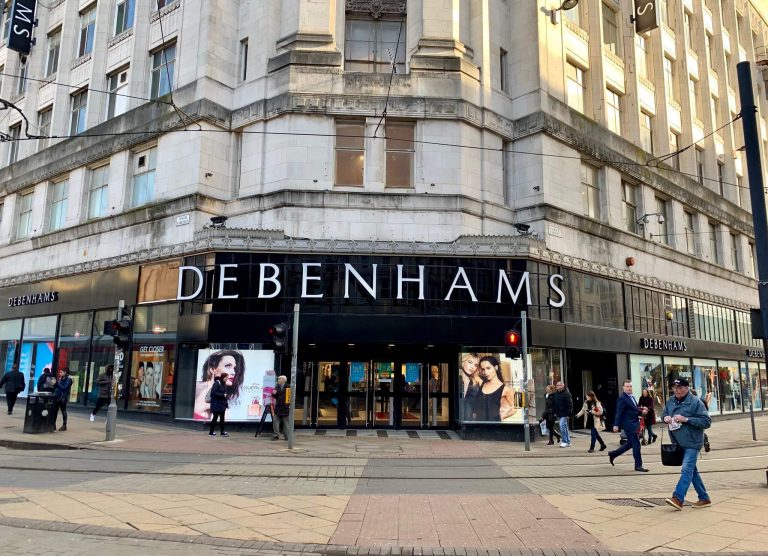
By Dr Inci Toral and Dr Sarah Montano
Department of Marketing, University of Birmingham
Unfortunately, we are seeing the demise of the department stores such brands as Debenhams, John Lewis and House Fraser, due to the fact that as large organisations it is difficult for them to be agile and respond quickly to new consumer needs.
Since the last global recession of 2008 retail has struggled to recover with many established retailers closing down such as BHS and TJ Hughes. When combined with the consumer shift to online shopping and the significant impact of COVID-19, we are seeing further job losses across the sector Notably, it is established retailers that are finding current trading conditions challenging such as Debenhams who are drawing up plans for liquidation and M&S who are to cut 7,000 jobs over the next 3 months. These brands are as familiar and comfortable to us as a pair of slippers – so why are such well-loved department stores facing such challenges and what do such closures mean for the future of retail?
Within the retail sector change is inevitable and is susceptible to various conditions, such as demand, technology, important social developments and more. Change is almost invisible and continuous when it is incremental. It is the sudden change that we feel more and realise the impact of things that involve us. Therefore, suddenly as consumers when we hear that a well-known retailer will be closing such as Woolworths it is almost surprising. But we would all agree that our high streets today do not look the same as those in the 1950’s.
Anticipating change in consumer demand
Retail failure is not inevitable as we did see some retailers coming out of the recession stronger than ever. While some retailers exited the high street, others kept a more innovative approach and invested in different areas to overcome the impacts of the downturn. The most successful retailers are those who anticipated the changing waves of consumer demand.
At this moment, we have seen the term omni-channel being introduced and leading to retail success: Amazon, an all-time online retailer decided to open brick and mortar supermarkets with AI technology in the USA and will shortly open several stores in the UK. In response to Amazon’s move, Walmart, the biggest retailer in the world, bought an online business. Aldi, which is listed among the 10 biggest retailers in the world (above Tesco) enhanced their market segment to middle class and started to open new formatted stores in more affluent districts. It would be unfair if we didn’t mention Poundland and its growth during the downturn.
COVID-19 and innovative thinkers
However, in normal times institutional/industrial norms allow very little room, if any for challenging establishment. Large conglomerates become the victim of these norms that are in effect introduced by the very same firms. In normal times, they enjoy the norms they established and protected for so long, they usually don’t feel the need to change, until a disruptive innovation challenges them (e.g. the entry of Amazon to all retailing markets as a category killer). Being caught in a shock while in inaction would always be catastrophic.
Unfortunately, we are seeing the demise of the department stores such brands as Debenhams, John Lewis and House Fraser, due to the fact that as large organisations it is difficult for them to be agile and respond quickly to new consumer needs. This was particularly, highlighted during the pandemic when small entrepreneurs and wholesalers created a new value chain. For example, you can now order your organic vegetables and fruits to your home easier than ever. You can even have a Michelin starred dinner at home delivered to your door.
All of these are entrepreneurial firms have been able to be more flexible than large corporations. However, there is still scope for large businesses to innovate. For example, Morrison’s, although delayed, started a new service with Amazon, you can now order all of your weekly shopping through a service called Prime Now.
So, what does the potential closure of such well-loved department stores mean for the consumer and the high street? The reason why these business are exiting the high street is precisely because consumers have changed. They have new needs and have found new ways of accessing the products they require, so the consumer may not notice the loss of these companies in their day to day lives. However, where we will see the impact is in our shopping centres and high streets as these units are likely to stay empty until innovators come along to replace them. But as we have noted retail always changes, innovators will emerge from the pandemic – so no we might not see Debenhams on our high street but we might soon be shopping at Amazon Go.
Global crises, in fact, offer great opportunities for the innovative thinkers as the norms and regulations do not apply or in other words, uncertainties surrounding the marketplace can be shaped and reshaped by new ways of thinking.
- More about Dr Sarah Montano at the University of Birmingham
- More about Dr Inci Toral at the University of Birmingham
- Back to Business School Blog
The views and opinions expressed in this article are those of the author and do not necessarily reflect the official policy or position of the University of Birmingham.
